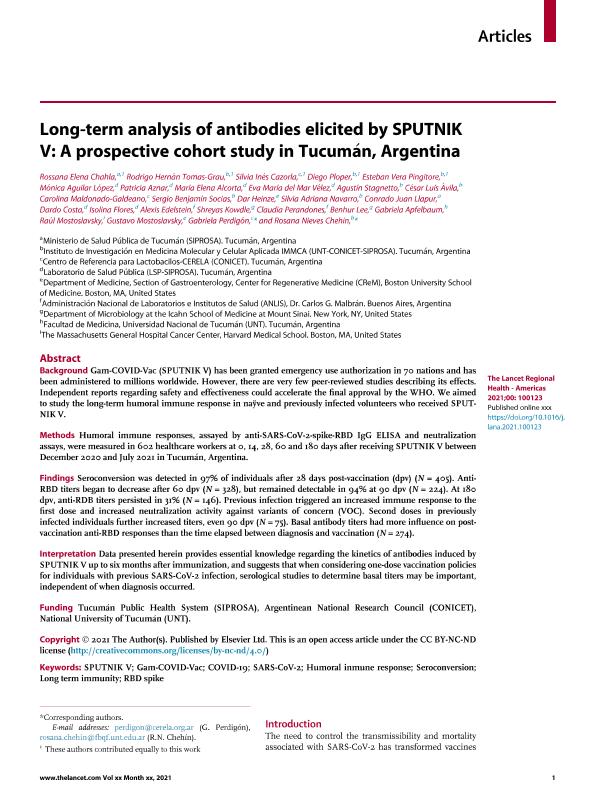Artículo
Long-term analysis of antibodies elicited by SPUTNIK V: A prospective cohort study in Tucumán, Argentina
Chahla, Rossana Elena; Tomas Grau, Rodrigo Hernán ; Cazorla, Silvia Ines
; Cazorla, Silvia Ines ; Ploper, Diego
; Ploper, Diego ; Vera Pingitore, Esteban
; Vera Pingitore, Esteban ; Aguilar López, Mónica; Aznar, Patricia; Alcorta, María Elena; Velez, Eva Maria del Mar
; Aguilar López, Mónica; Aznar, Patricia; Alcorta, María Elena; Velez, Eva Maria del Mar ; Stagnetto, Agustín
; Stagnetto, Agustín ; Avila, Cesar Luis
; Avila, Cesar Luis ; Maldonado Galdeano, María Carolina
; Maldonado Galdeano, María Carolina ; Socias, Sergio Benjamin
; Socias, Sergio Benjamin ; Heinze, Dar; Navarro, Silvia Adriana
; Heinze, Dar; Navarro, Silvia Adriana ; Llapur, Conrado Juan; Costas, Dardo; Flores, Isolina; Edelstein, Alexis; Kowdle, Shreyas; Perandones, Claudia; Lee, Benhur; Apfelbaum, Gabriela; Mostoslavsky, Raul; Mostoslavsky, Gustavo; Perdigon, Gabriela del Valle
; Llapur, Conrado Juan; Costas, Dardo; Flores, Isolina; Edelstein, Alexis; Kowdle, Shreyas; Perandones, Claudia; Lee, Benhur; Apfelbaum, Gabriela; Mostoslavsky, Raul; Mostoslavsky, Gustavo; Perdigon, Gabriela del Valle ; Chehin, Rosana Nieves
; Chehin, Rosana Nieves
 ; Cazorla, Silvia Ines
; Cazorla, Silvia Ines ; Ploper, Diego
; Ploper, Diego ; Vera Pingitore, Esteban
; Vera Pingitore, Esteban ; Aguilar López, Mónica; Aznar, Patricia; Alcorta, María Elena; Velez, Eva Maria del Mar
; Aguilar López, Mónica; Aznar, Patricia; Alcorta, María Elena; Velez, Eva Maria del Mar ; Stagnetto, Agustín
; Stagnetto, Agustín ; Avila, Cesar Luis
; Avila, Cesar Luis ; Maldonado Galdeano, María Carolina
; Maldonado Galdeano, María Carolina ; Socias, Sergio Benjamin
; Socias, Sergio Benjamin ; Heinze, Dar; Navarro, Silvia Adriana
; Heinze, Dar; Navarro, Silvia Adriana ; Llapur, Conrado Juan; Costas, Dardo; Flores, Isolina; Edelstein, Alexis; Kowdle, Shreyas; Perandones, Claudia; Lee, Benhur; Apfelbaum, Gabriela; Mostoslavsky, Raul; Mostoslavsky, Gustavo; Perdigon, Gabriela del Valle
; Llapur, Conrado Juan; Costas, Dardo; Flores, Isolina; Edelstein, Alexis; Kowdle, Shreyas; Perandones, Claudia; Lee, Benhur; Apfelbaum, Gabriela; Mostoslavsky, Raul; Mostoslavsky, Gustavo; Perdigon, Gabriela del Valle ; Chehin, Rosana Nieves
; Chehin, Rosana Nieves
Fecha de publicación:
20/11/2021
Editorial:
Elsevier
Revista:
The Lancet Regional Health - Americas
ISSN:
2667-193X
Idioma:
Inglés
Tipo de recurso:
Artículo publicado
Clasificación temática:
Resumen
Background: Gam-COVID-Vac (SPUTNIK V) has been granted emergency use authorization in 70 nations and has been administered to millions worldwide. However, there are very few peer-reviewed studies describing its effects. Independent reports regarding safety and effectiveness could accelerate the final approval by the WHO. We aimed to study the long-term humoral immune response in nay¨ve and previously infected volunteers who received SPUTNIK V.
Methods: Humoral immune responses, assayed by anti-SARS-CoV-2-spike-RBD IgG ELISA and neutralization assays, were measured in 602 healthcare workers at 0, 14, 28, 60 and 180 days after receiving SPUTNIK V between December 2020 and July 2021 in Tucuman, Argentina.
Findings: Seroconversion was detected in 97% of individuals after 28 days post-vaccination (dpv) (N = 405). Anti-RBD titers began to decrease after 60 dpv (N = 328), but remained detectable in 94% at 90 dpv (N = 224). At 180 dpv, anti-RDB titers persisted in 31% (N = 146). Previous infection triggered an increased immune response to the first dose and increased neutralization activity against variants of concern (VOC). Second doses in previously infected individuals further increased titers, even 90 dpv (N = 75). Basal antibody titers had more influence on postvaccination anti-RBD responses than the time elapsed between diagnosis and vaccination (N = 274).
Interpretation: Data presented herein provides essential knowledge regarding the kinetics of antibodies induced by SPUTNIK V up to six months after immunization, and suggests that when considering one-dose vaccination policies for individuals with previous SARS-CoV-2 infection, serological studies to determine basal titers may be important, independent of when diagnosis occurred.
Archivos asociados
Licencia
Identificadores
Colecciones
Articulos (IMMCA)
Articulos de INSTITUTO DE INVESTIGACIONES EN MEDICINA MOLECULAR Y CELULAR APLICADA DEL BICENTENARIO
Articulos de INSTITUTO DE INVESTIGACIONES EN MEDICINA MOLECULAR Y CELULAR APLICADA DEL BICENTENARIO
Articulos(CERELA)
Articulos de CENTRO DE REFERENCIA PARA LACTOBACILOS (I)
Articulos de CENTRO DE REFERENCIA PARA LACTOBACILOS (I)
Citación
Chahla, Rossana Elena; Tomas Grau, Rodrigo Hernán; Cazorla, Silvia Ines; Ploper, Diego; Vera Pingitore, Esteban; et al.; Long-term analysis of antibodies elicited by SPUTNIK V: A prospective cohort study in Tucumán, Argentina; Elsevier; The Lancet Regional Health - Americas; 6; 20-11-2021; 1-14
Compartir
Altmétricas



